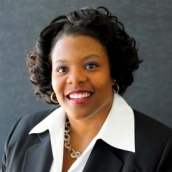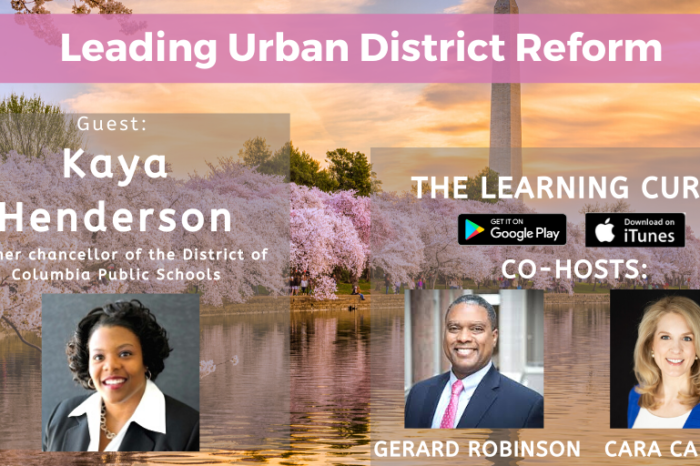Kaya Henderson, Former Chancellor, D.C. Public Schools, on Leading Urban District Reform
This week on “The Learning Curve,” Cara and Gerard are happy to be joined by Kaya Henderson, the former chancellor of the District of Columbia Public Schools. They discuss the historic reforms Henderson oversaw, including increasing enrollment and improved test scores in an urban district that had been one of the lowest performing in the country. Kaya talks about her unique and authentic leadership style and her focus on re-building the D.C. Public Schools into a viable option that restored confidence among parents. She shares some of the key ingredients for success, the challenges of navigating political forces, her thoughts on the D.C. voucher program, and what really motivated district change. She also credits her controversial predecessor Michelle Rhee with challenging the district’s bureaucracy and creating some of the conditions for success. Lastly, she reflects on how the relationship-building skills she brought to her position are serving her well in her current role with Teach for All, which runs “Teach for America”-style programs in 53 countries; as an independent consultant in the U.S.; and on numerous boards, where she is involved in COVID relief efforts.
Stories of the Week: Dr. Anthony Fauci, speaking at a U.S. Senate hearing this week, cautioned that reentry of students in the fall term would likely be “a bridge too far” due to the lack of available COVID treatments or a vaccine. Are American families and schools prepared for long-term digital learning? This week is National Charter Schools Week, the annual celebration of the charter schools that are educating over three million students, and have been so successful in bridging achievement gaps. Gerard and Cara reflect on the history of the charter movement, the many teachers, families, and local leaders involved in launching it, and the bipartisan political support that it has enjoyed.
Newsmaker Interview Guest:
 Kaya Henderson is best known for her role as Chancellor of D.C. Public Schools (DCPS) from 2010-2016. Her tenure was marked by consecutive years of enrollment growth, the highest graduation rates in the district’s history, and the largest growth of any urban district on the NAEP over multiple years. Henderson’s previous work includes being a middle school Spanish teacher in the South Bronx, D.C. Executive Director for Teach for America, Vice President of Strategic Partnerships at The New Teacher Project, and Deputy Chancellor of the DCPS. She received her Bachelor’s degree in International Relations and her Master of Arts in Leadership from Georgetown University, as well as honorary degrees from Georgetown and Trinity Washington University.
Kaya Henderson is best known for her role as Chancellor of D.C. Public Schools (DCPS) from 2010-2016. Her tenure was marked by consecutive years of enrollment growth, the highest graduation rates in the district’s history, and the largest growth of any urban district on the NAEP over multiple years. Henderson’s previous work includes being a middle school Spanish teacher in the South Bronx, D.C. Executive Director for Teach for America, Vice President of Strategic Partnerships at The New Teacher Project, and Deputy Chancellor of the DCPS. She received her Bachelor’s degree in International Relations and her Master of Arts in Leadership from Georgetown University, as well as honorary degrees from Georgetown and Trinity Washington University.
The next episode will air on May 22nd, 2020 with guest, Kerry McDonald, a Senior Education Fellow at the Foundation for Economic Education and author of Unschooled: Raising Curious, Well-Educated Children Outside the Conventional Classroom.
Tweet of the Week:
It’s National #CharterSchoolsWeek! DYK? There are currently more than 7,400 public charter schools across the country. They serve more than 3 million students and their families! More from @POTUS: https://t.co/c1Ous1adas pic.twitter.com/giqxsGY5SQ
— U.S. Department of Education (@usedgov) May 12, 2020
News Links:
It’s National Charter Schools Week
https://www.publiccharters.org/what-you-can-do/celebrate-national-charter-schools-week
You’ll Still Be Homeschooling Your Kids This Fall, Dr. Fauci Says
https://bestlifeonline.com/fauci-schools-open-fall/
Get Updates on Our Education Research
Recent episodes:















